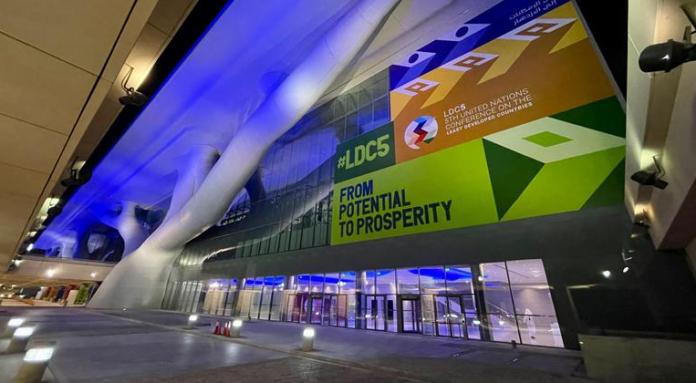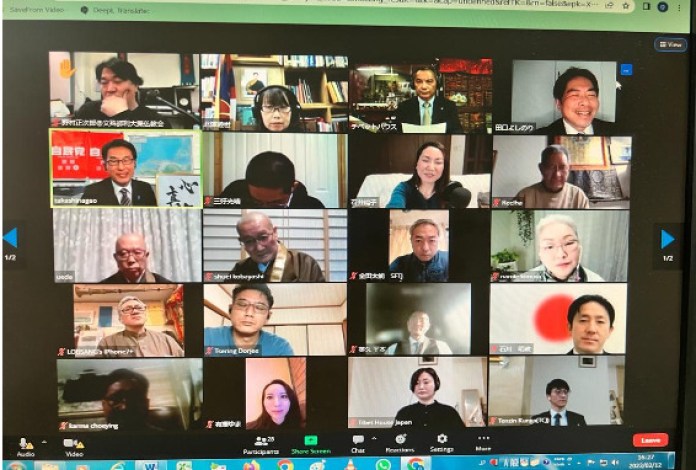The Fifth UN Conference on the Least Developed Countries (LDC5) concluded on Thursday with countries adopting concrete measures to implement the Doha Programme of Action (DPoA) – which aims to renew and strengthen commitments between LDCs and their development partners – marking a transformative turning point for the world’s most vulnerable countries.
The Doha Political Declaration was adopted to a round of applause in the plenary hall of the Qatar National Convention Centre, where LDC5 has been under way since 5 March.
Ushering in new era of solidarity, and enormous socio-economic benefits for world’s 46 least developed countries, today’s action comes nearly one year after the DPoA was adopted at the first part of the Conference on 17 March 2022 in New York.
The Declaration outlines measures to promote transformation and unlock the potential of LDCs, including the development of a system of reserves or alternative means, ranging from cash transfers to comprehensive multi-hazard crisis mitigation and resilience-building measures for the least developed countries.
“The commitments and responsibilities do not stop and start with the signing of the documents or attending Conferences. They must be integral to our efforts towards 2030 and extend for the full decade,” said Amina Mohammed, Deputy Secretary-General of the United Nations at the closing plenary meeting.
‘We must go further still’
She pointed out that the five key deliverables from the DPoA – an online university, a graduation support package, a food stock holding solution, an investment support centre, and a crisis mitigation and resilience building mechanism – “will answer key challenges facing the LDCs, and set the path for a more prosperous, equitable future”.
“But success is not automatic. But we must go further still,” stressed Ms. Mohammed. “To achieve these deliverables, LDCs will need massive financing – at scale, and directed where it matters most.”
She noted that Secretary-General António Guterres had earlier proposed reforms to the international financial architecture, alongside an SDG Stimulus of at least $500 billion a year, to direct resources towards long-term sustainable development and just transitions. This funding could help LDCs tackle issues that are preventing them from realizing their potential.
“If we are to have any hope of achieving the SDGs, we must put first those who are furthest behind on their development journeys,” stated the UN deputy chief.
While in Doha, Ms. Mohammed also, engaged with Government officials, civil society representatives and UN Resident Coordinators from around the world. In her meetings, she underscored the importance of crisis mitigation and increasing resilience for LDCs, with the DPoA as the blueprint to uplift the most vulnerable countries.

This week at LDC5
Under the theme ‘From Potential to Prosperity’, the LDC5 Conference aimed to drive transformational change to positively affect the 1.2 billion people who live in the LDCs.
LDC5 welcomed some 9,000 participants, including 46 Heads of State and Government and nearly 200 ministers and vice-ministers, who called for urgent support from developed countries to advance socio-economic and environmental development in LDCs.
Business leaders, together with civil society, youth and other partners, shared initiatives, and recommendations in a range of areas, from enhancing LDCs’ participation in international trade and regional integration to harnessing the power of science, technology, and innovation.
The Deputy Secretary-General acknowledged this broad-based participation, saying: “Throughout this week we have seen what can be achieved through genuine partnership and multilateral dialogue. Each track — youth, South-South Cooperation, private sector, Parliamentarians, and civil society — has contributed energy, vision and ideas for lasting change.”
Discussions at LDC5 centred on the implementation of the DPoA. The agreements reached this week will help LDCs address the current crisis, from the COVID-19 pandemic to climate change, and help them get back on track with the SDGs and make progress towards graduation from the LDC category.
“The LDCs have the most untapped potential in the world, from natural to human resources.” said Rabab Fatima, Secretary-General of the Conference and UN High Representative for the Least Developed Countries, Landlocked Developing Countries and Small Island Developing States (UN-OHRLLS).
“What we delivered this week can harness this potential and chart a prosperous future for people in LDCs.”
She urged those present, upon leaving Doha, to consider “what we can contribute to implementing to Doha Programme of Action in our own context and capacities”. Emphasizing that political commitment is the “fuel that will drive the engine of progress”, she welcomed expressions of national ownership of the DPoA and urged development partners to tailor their national cooperation policies in a manner that meets the expectations and aspirations of least developed countries.
Lazarus McCarthy Chakwera, President of Malawi and Chair of the Group of Least Developed Countries, described the Conference as “a triumph of style and of substance”. The stakes could not have been higher when the Conference began, he said, recalling the many calls for stronger partnerships made over the past five days.
Developed countries were reminded of their official development assistance (ODA) commitments, he said, stressing that it is time to fulfil that historic commitment to allocate between 0.15 per cent and 0.20 per cent of their gross national income. If this, and other promises in the areas of trade, investment and technology transfer can be honoured, then we will leave with fresh hope that the Doha Programme of Action will be implemented in full, he added.
Soltan bin Saad Al-Muraikhi, State Minister for Foreign Affairs of Qatar, also delivered closing remarks as President of the Conference. Noting the commitments pledged during the last five days, he stressed the need for practical measures and recalled his own country’s significant financial pledges. Qatar would place least developed countries at the heart of international cooperation, he said.

Commitments made at LDC5:
- Qatar announced a financial package of $60 million: $10m to support the implementation of the DPoA and $50 million to help build resilience in the LDCs.
- Germany dedicated €200 million in new money in 2023 for financing for LDCs.
- Canada announced $59 million to deliver Vitamin supplements in 15 LDCs and ecosystem conservation in Burkina Faso.
- The EU Commission announced cooperation agreements advancing sustainable investments in Africa totalling more than €130 million.
- Finland announced an annual event called the United Nations LDC Future Forum in Helsinki, with the Office of the UN High Representative for the Least Developed Countries, Landlocked Developing Countries and Small Island Developing States – OHRLLS –, to ensure the latest thinking and research is being put to work to ensure progress on the most vulnerable states.
- The Green Climate Fund announced a new project to give $80 million in equity to offer green guarantees to business in LDCs and bring down the cost of capital..
- The United Nations World Tourism Organisation, announced a new €10 million Tourism for Development Fund for LDCs, supported by TUI Care Foundation, that will invest by 2030 to support sustainable tourism in LDCs as a key driver of development.
- The Government of Kazakhstan pledged $50,000 to continue their work supporting the most vulnerable member states of the United Nations.











